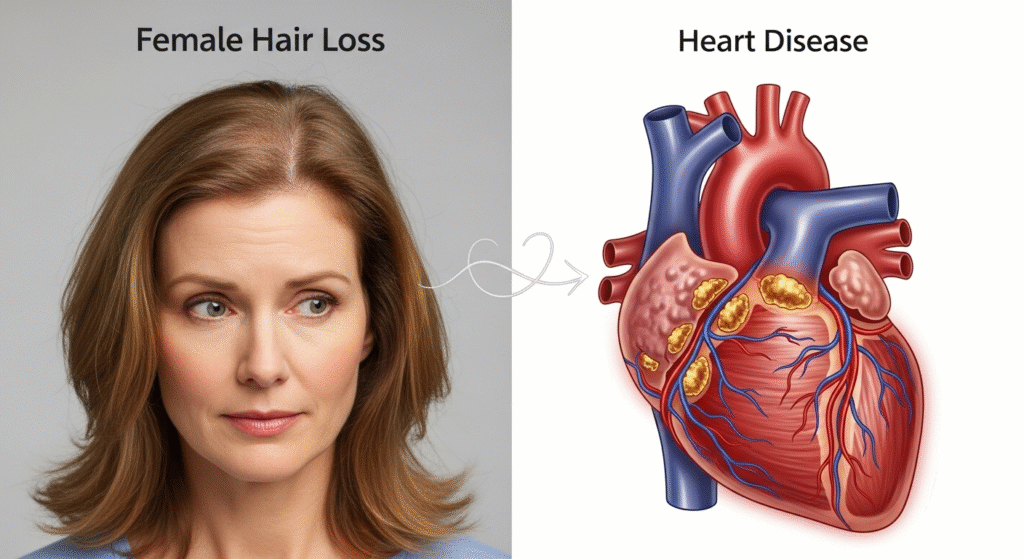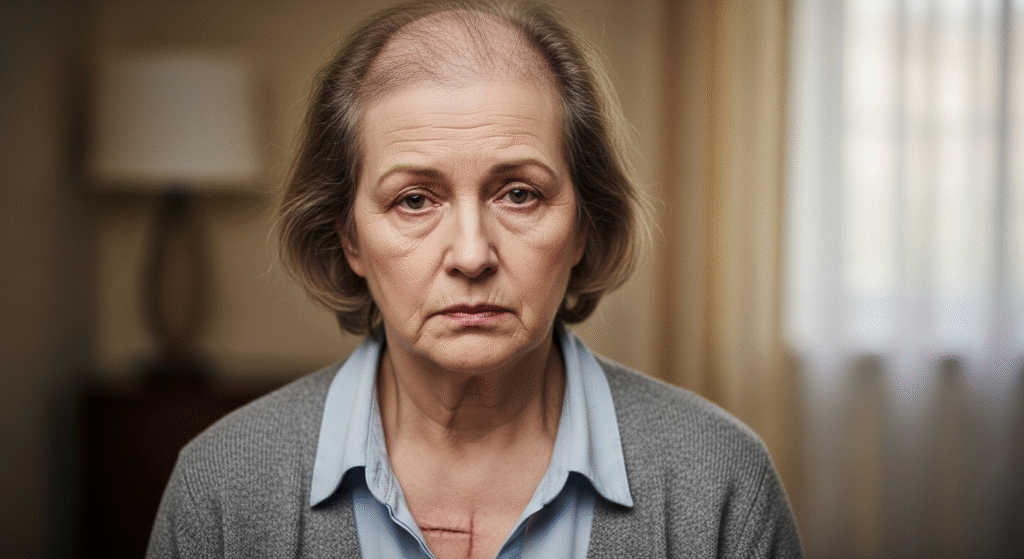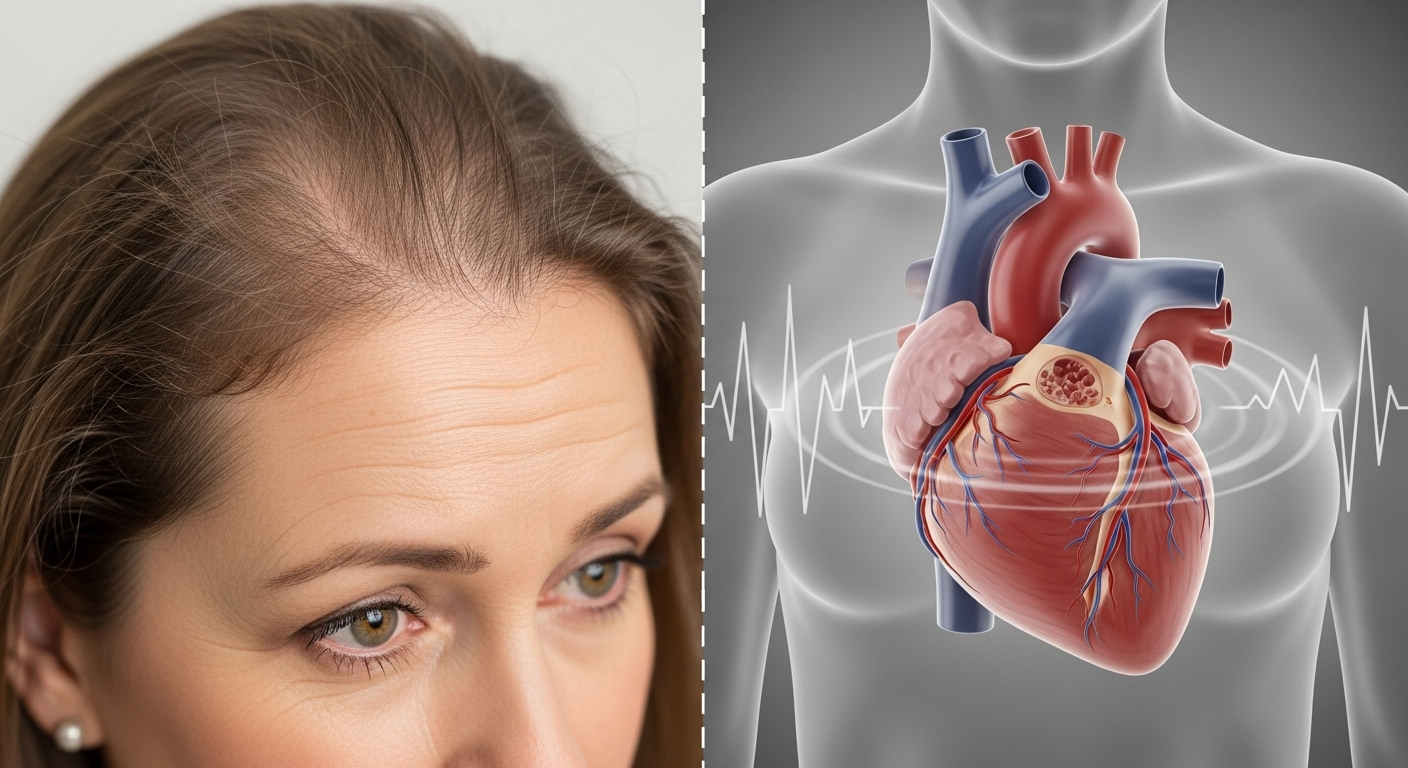Female hair loss and heart disease may seem unrelated, but emerging studies suggest there could be a connection. Understanding how these two conditions might be linked is crucial for early detection and prevention. In this article, we’ll explore how female hair loss can sometimes indicate an underlying risk for heart disease, what the connection is, …
Female hair loss and heart disease may seem unrelated, but emerging studies suggest there could be a connection. Understanding how these two conditions might be linked is crucial for early detection and prevention.
In this article, we’ll explore how female hair loss can sometimes indicate an underlying risk for heart disease, what the connection is, and how to manage both. This knowledge can empower you to make informed decisions about your health and address potential risks early on.

What Is Female Hair Loss?
Female hair loss, or female pattern hair loss (FPHL), is a condition that affects millions of women worldwide, with approximately 50% of women experiencing some form of hair loss by age 70. Unlike male pattern baldness, which often results in a receding hairline or bald spot, FPHL is characterized by diffuse thinning, typically around the crown of the head.
- Common Causes of Female Hair Loss:
- Hormonal Changes: Conditions like menopause, pregnancy, and polycystic ovary syndrome (PCOS) often trigger hair thinning due to hormonal fluctuations.
- Nutritional Deficiencies: Lack of essential nutrients, such as iron or biotin, can lead to weakened hair follicles.
- Stress and Medical Conditions: Chronic stress, thyroid disorders, and autoimmune diseases can also contribute to hair loss.
While hair loss is a common issue, it can sometimes be a sign of something more serious, such as heart disease, especially in women.
The Link Between Female Hair Loss and Heart Disease

Recent studies suggest that female hair loss, particularly androgenetic alopecia (a type of genetic hair loss), may be more than just a cosmetic issue. There seems to be a connection between hair loss and cardiovascular health.
- Scientific Studies and Findings:
- Research indicates a correlation between female hair loss and coronary artery disease, especially in women under 55. In one study, women with androgenetic alopecia showed an increased risk of coronary artery disease, which is a major risk factor for heart attacks.
- Another study found that women with hair loss were more likely to suffer from high blood pressure, high cholesterol, and insulin resistance—conditions that increase the risk of heart disease.
- The Mechanism Behind the Link:
- Hormonal Imbalances: Both heart disease and hair loss can be influenced by the same hormonal imbalances, particularly involving androgens, insulin resistance, and thyroid hormones.
- Inflammation: Chronic inflammation plays a role in both hair loss and cardiovascular conditions. Inflammation can damage the blood vessels in the scalp, reducing the flow of nutrients to hair follicles, while also contributing to heart disease.
- Metabolic Syndrome: Women with metabolic syndrome (which includes obesity, high blood pressure, and high cholesterol) are at greater risk of both heart disease and hair thinning.
Risk Factors Overlapping Between Hair Loss and Heart Disease

The common risk factors that contribute to both heart disease and hair loss highlight the potential overlap between the two conditions. Understanding these shared risk factors is crucial for women who are concerned about their health.
- Elevated Testosterone Levels:
- Higher levels of testosterone, particularly in women with conditions like PCOS, can contribute to both hair loss and cardiovascular issues. Elevated testosterone can lead to hair thinning along the scalp and can also negatively affect blood pressure and cholesterol levels, both of which are key risk factors for heart disease.
- Insulin Resistance and Metabolic Syndrome:
- Both hair loss and heart disease are linked to insulin resistance, a condition in which the body doesn’t respond properly to insulin, leading to higher blood sugar levels. Insulin resistance is associated with hair thinning, particularly in women with a family history of heart disease.
- Chronic Inflammation:
- Inflammation is a major factor in both hair loss and cardiovascular disease. The inflammation that occurs in the blood vessels can also affect hair follicles, leading to hair thinning and potentially worsening heart conditions.
Importance of Early Detection
Detecting signs of hair loss early can be an important step in identifying underlying health issues, including heart disease.
- Monitoring Hair Changes:
- If you notice changes in your hair, such as excessive thinning, it’s essential to pay attention to other potential symptoms of heart disease, such as fatigue, chest pain, or shortness of breath. Early recognition of these changes can help you take proactive steps toward improving your overall health.
- Regular Cardiovascular Check-ups:
- If you have a history of hair loss or notice new thinning patterns, it’s wise to have your heart health checked regularly. Early detection of heart disease can lead to better management and prevention of more severe issues.
Management and Prevention Strategies
Managing both heart health and hair loss requires a holistic approach that includes lifestyle changes, regular medical check-ups, and proper hair care practices.
- Lifestyle Modifications:
- Heart-Healthy Diet: A diet rich in fruits, vegetables, lean proteins, and whole grains can help manage blood pressure, cholesterol levels, and overall heart health, which may also promote healthier hair.
- Exercise: Regular physical activity improves circulation, reduces stress, and helps regulate hormones, all of which contribute to both healthy hair and a healthy heart.
- Medical Interventions:
- Medications that treat both conditions may be prescribed. For instance, hormonal therapies or treatments that address insulin resistance may benefit both heart health and hair restoration.
- Topical treatments such as minoxidil for hair regrowth can be considered for managing hair loss, while statins and blood pressure medications can manage cardiovascular risk.
- Stress Management:
- Both hair loss and heart disease are exacerbated by stress. Managing stress through techniques such as yoga, meditation, or counseling can improve both heart and hair health.
FAQs
Can female hair loss be a sign of heart disease?
While hair loss itself is not a direct indicator of heart disease, studies suggest a correlation between androgenetic alopecia and an increased risk of cardiovascular problems.
What are the common risk factors for both heart disease and hair loss?
Hormonal imbalances, elevated testosterone levels, insulin resistance, and chronic inflammation are all risk factors that contribute to both conditions.
Can improving my heart health help with hair loss?
Yes, improving heart health through lifestyle changes can positively impact your overall well-being, potentially improving hair health as well.
Should I see a doctor if I notice hair thinning?
Yes, especially if you have other risk factors for heart disease. A healthcare provider can assess both your hair health and cardiovascular risk.
Can medication for heart disease affect my hair?
Some medications used to treat heart disease, like beta-blockers, can cause hair thinning as a side effect. Speak to your doctor about alternatives if this occurs.
Conclusion
While female hair loss and heart disease are often considered separate issues, emerging research suggests they may be linked. Recognizing the signs early and addressing both conditions with the right lifestyle changes and medical interventions can help reduce the risk of more severe health problems.
If you’re experiencing hair thinning or have concerns about your heart health, book a consultation with Dr. Uzma Irfan, an ISHRS-certified surgeon in Islamabad today,. We offer personalized advice and treatment options to help you manage both conditions and maintain a healthy lifestyle.






